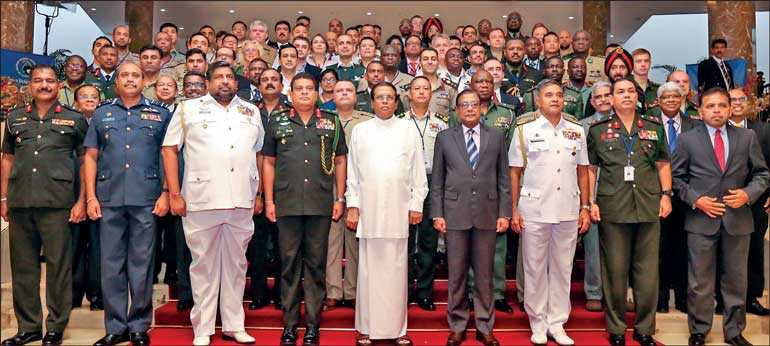Saturday Feb 21, 2026
Saturday Feb 21, 2026
Wednesday, 4 September 2019 00:00 - - {{hitsCtrl.values.hits}}

By Shanika Sriyananda
A policy analyst on South Asian security affairs and former Commander of the Indian Peace Keeping Forces (IPKF) Maj. Gen. (Retd) Ashok K. Mehta said under a new government alleged war crimes during the final phase of the war would need to be investigated for reconciliation efforts to have credibility, but also backed a home-grown investigation.
He said the government had the right to decide whether it was open to foreign involvement in such an investigation but Sri Lanka had to take action on the commitment that it had made before the United Nations Human Rights Commission (UNHRC) in 2015.
“For this conflict resolution to be completed, the question of winning over the Tamil minority and giving justice to them also need to be addressed. Some progress was made by setting up of the Office of Missing Persons but I don’t think it is being followed through. There is a need for the Government to walk the talk on the UNHCR resolution of 2015,” he told Daily FT.
He opined that the major aspect of an enduring peace was transitional justice and reconciliation but he did not see that it had been followed seriously by the Government.
Maj. Gen. Mehta said some Western countries had expressed similar views which were seen by their absence from the first-ever Colombo Defence Seminar in 2011.
“Still the allegations are the same and following the 2015 UNHCR sessions, the investigation process should have been implemented by the Sri Lankan Government, which got two years first and then another two-year extension to probe into these allegations. It is good for Sri Lanka as a country which respects international law to go through this process of investigation and bring people who actually violated human rights to justice,” he stressed.
According to Maj. Gen. Mehta, the investigation process has to be a transparent process to clear those war crime allegations. “It is perfectly legitimate for a country to have its own transparent, free and fair process of probing into those allegations,” he said.
Referring to the recent war crime allegations levelled against new Army Chief Lt. Gen. Shavendra Silva, he said not it was only probing allegations against him, but under a new government the entire war crimes issue needed to be investigated.
“There is a whole process to go through on reconciliation and transitional justice, which must be first initiated and secondly implemented with seriousness and honesty,” he said.
Commending the SLA for organising the Defence Seminar for the 11th consecutive year, he said it was useful for countries to renew military contacts.
He said India had assisted SLA to defeat the JVP insurrection and also to weaken the LTTE during the IPKF’s year-long military engagement in Sri Lanka. “Most importantly we built relationships between the two armies which has endured all political turbulence. I think no other government or military has been able to root out terrorism comprehensively as the Sri Lankan military was able to do. And I also do not believe that any other country will be able to eliminate terrorism similar to Sri Lanka in the future,” he said.
Maj. Gen. Mehta said regional cooperation was vital to address militancy, radicalisation, terrorism and cross border terrorism, which were the biggest threats to the South Asian region.
The former IPKF Commander said India lost over 12,000 Indian soldiers and over 5,000 were wounded during battles with the LTTE and India made such a sacrifice because it wanted to protect the territorial integrity and sovereignty of Sri Lanka.
“But a lot of Sri Lankans complain against IPKF. No other country would lose their soldiers to protect a neighbouring country like India,” he said, adding that it was disheartening to witness a country that had defeated terrorism suddenly dealing with suicide bombers again.
He also said radicalised extremism had no borders and every country needed to be concerned about trans-border terrorism.
“The most vital workable intelligence sharing was provided by India on strengthening military cooperation between India and Sri Lanka. When it comes to terrorist attacks both countries have gone through very difficult eras and also suffered from terrorism. This military cooperation needs to be strengthened not only between India and Sri Lanka but in the entire South Asian region to counter-terrorism and extremism,” he explained.
He said reconciliation was essential to prevent the resurgence of extremism, but claimed the reconciliation process had not taken off because there was a lack of political will to address reconciliation.
“The resurgence of militancy needs to be stamped out. It took 30 years to get rid of the LTTE terrorism and now Sri Lanka must be committed for another 30 months or more to reconcile people,” he stressed.